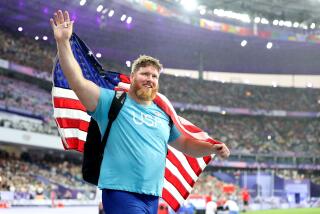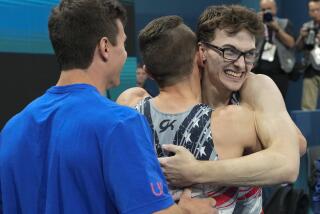Orser Goes O for the Olympics, Finishing Second Once Again
- Share via
CALGARY, Canada — O, Canada. O, how badly you wanted to host the Olympics. O, how badly you have done in the Olympics. You have thrown two of these parties now, a Summer one and a Winter one, but you do not have a single gold medal to show for it. The judges’ score: 0.0.
Everything was supposed to change here Saturday night, when you sent the Big O, Brian Orser, the kid with the Flash Gordon wardrobe and the Woody Woodpecker haircut, out after the gold medallion in men’s figure skating. Orser was a golden boy if ever there was one. He was an ice machine. He was Gretzky without a stick.
As far as loyal and royal Canadians alike were concerned, there was no greater skater anywhere than Orser, and certainly no greater Brian--not Boitano, not Mulroney, not Bosworth, not Trottier, not Downing, not Wilson, not anybody. His country made him a member of the Canadian Order, the equivalent of a British subject being knighted, and his hometown of Orillia, Ontario, gave him its own highest honor: It named the neighborhood skating rink Brian Orser Arena.
The stage of white was set. Orser might be second to Their Brian, the American, going into the final round, and yes, Mr. Boitano did skate a perfectly splendid routine. But, once Our Brian gets out there, said the maple-leaf mob occupying the Saddledome seats, he will show those judges a thing or two. In fact, make that a thing or three --just wait’ll they see that triple axel, eh?
Orser was a guy who could do triple axels in his sleep. He was mastering triple axels when other kids were taking off their training skates. In competitions or practice, he could do one after another after another, no problem, to the point that the maneuver became his trademark. A banner on a wall of Brian Orser Arena even informs guests there: “You’re in Triple Axel Country.”
Yet, when Orser went forth to do his duty Saturday night, the strangest thing happened. When he was supposed to do his triple axel, he did a double, instead. Like a baseball player, he decided not to try to stretch his double into a triple. And that, in a nutshell, is what has happened to Brian Orser in the last two Winter Olympics, and in much of his skating career.
He has had to settle for second.
Second in the 1984 Winter Olympics at Sarajevo, Yugoslavia. Second at the World Championships in 1984, 1985, 1986. Now, second in these Olympics. The guy has more silver than the Hunt brothers.
The strangest thing about this experience was that not only did Orser believe he had won the gold medal, upon completing his routine, but he discovered that he had not won when former Olympic skater David Santee, working for ABC-TV, dropped the bomb on him without warning.
All finished with his evening’s work, Orser went back to the “kiss-and-cry area,” where skaters smooch their coaches and choreographers and loved ones and then wait for their scores to be flashed to the world by the judges.
ABC, though, already had computed the winner, and was not about to wait for the official word--not unlike a network’s coverage of a presidential primary. Santee, toting his microphone, slid up next to the huffing and puffing Orser on the rinkside bench.
“I’ve got good news for you and I’ve got bad news for you,” Santee said.
Orser waited.
“The good news is that you skated brilliantly,” Santee said, or something very close to that. “The bad news is that you finished second.”
Orser’s face fell like a souffle.
He sincerely thought that his performance had been good enough to snatch the necklace from Boitano’s throat. Even with a stumble on a triple flip during the first 90 seconds of his routine, and even though he turned his patented triple axel into a double, Orser was confident that he had given Canada a gold medal at last.
“I felt I had done it,” he said later.
No, he had not, even though a Czech judge gave him the only 6.0 score of the night. That little slip didn’t hurt him on every judge’s card, but it hurt him with enough of them. “That gave them just one little thing to knock me on,” Orser said.
It was, as TV commentator Dick Button put it, “the slightest of slightest glitches.” And, it was enough to make him take a lower stoop on the medal-presentation awards stand.
“And now, the presentation to the victors!” the public address announcer at Calgary’s Saddledome announced.
The other Brian, Boitano, went right to the top. Canada’s Brian stepped up next. And, they were joined by Viktor Petrenko of the Soviet Union, the 18-year-old kid who won the bronze medal. There they were, the victors and Viktor. Just as was said of Boitano and Orser four years ago, it was speculated that the young Soviet would be the next king of men’s figures.
Christopher Bowman of Van Nuys, who will have something to say about that in 1992, had something to say about it Saturday night, after placing seventh. Asked if Petrenko’s third-place effort has made him the gold medal favorite for the Winter Olympics of Albertville, France, Bowman said: “Did it matter for Orser in 1984?”
O, no, it did not.
More to Read
Go beyond the scoreboard
Get the latest on L.A.'s teams in the daily Sports Report newsletter.
You may occasionally receive promotional content from the Los Angeles Times.






